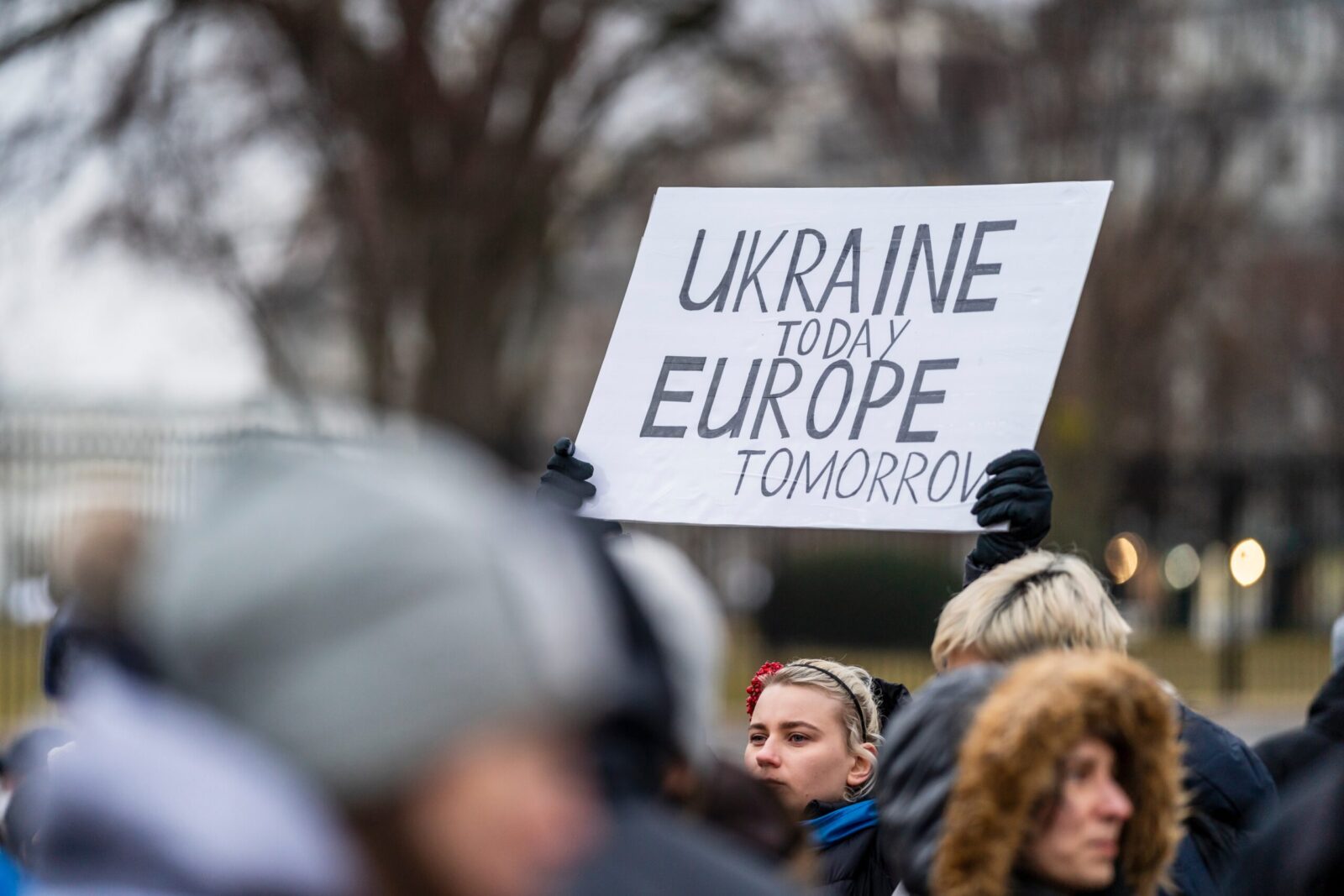Russia “raised the stakes” in Ukraine and Europe now faces a new test
Escalating tensions between Vladimir Putin and the West have forced Europe to defend its core values and principles based on international law. In reality, this crisis of European security has been a ticking time bomb for many years. Are the EU and NATO able to deter Russia and maintain their political and military power?
March 22, 2022 -
Silvie Leštinská
-
Articles and CommentaryUkraineAtWar

People gathering in Washington DC in front of the White House on February 24th 2022 to demand support for Ukraine and for an end to the war. Photo: bgrocker / Shutterstock
Marching on Ukraine and invading its territories hides Vladimir Putin’s main objective in Europe. The strategic importance of Ukraine has been consistently undermined by NATO and the EU not being willing to risk the beneficial ties between the West and Russia. Ukraine geopolitically has a key role in Europe. Its significance as a NATO member is crucial and should not be underestimated. Russia took advantage of the current instability in European politics and decided to restore its regional dominance, starting in Ukraine. Russia’s agile diplomatic game is aimed at fracturing NATO and serves as a test for Europe regarding whether or not it has learned from its mistakes.
Europe’s unwillingness to defend its political and military interests has led to endless diplomatic negotiations with Russia, ending in a full-scale war in 2022. A long-term trend can be observed in Putin’s approach. His boundless need to rebuild Russia’s superpower status and sphere of influence should have been a warning to the West.
Vladimir Putin considers all the territories of Ukraine and other former Soviet countries to be part of Russia’s sphere of influence. In various speeches, he made it clear that he does not believe that Ukraine is a sovereign and independent nation. Instead, he dared to deny Ukraine a future as a part of the West and NATO by fully invading it. Putin’s worldview is constructed from the art of lying, manipulating and bluffing in order to defend his actions. He perceives his historical role as a restorer, therefore his actions are in this matter consistent and Europe’s incorrigible. Moreover, he desires to dominate the world’s security system, making him a partner for negotiations with the West. Europe’s failed and overconfident rhetoric about NATO and the security of its allies has given the West its ultimate test. Will western countries give up their strategic partners like Ukraine or defend them?
At NATO’s Bucharest Summit in 2008, both the Georgian and Ukrainian delegations arrived with the expectation that they would receive the status of NATO candidate countries. However, both states left the summit empty-handed. This sent a clear message to the Kremlin. For Putin, this showed that NATO was not ready to stand up for its strategic partners. This event was soon followed by the Russian invasion of Georgia. Western leaders subsequently made several appeals regarding the possible consequences of this conflict. However, under President Obama, the US offered a policy of “reset” and Russia was offered the opportunity to modernise its economy. This was clearly seen by Putin as a green light to annex Crimea. After all, this move ultimately resulted in some weak long-term sanctions, ongoing diplomatic negotiations and the finalisation of Nord Stream 2.
Europe and the US are facing great challenges in terms of possible fragmentation. Unity is naturally hard to achieve when the economic national interests of larger states clash with security and justice in Europe as a whole. Europe’s response to Russia should be assertive, harsh and clear. This should mean implementing hard sanctions on Russian oil and gas. This step will be impossible to achieve whilst mainly German and French aspirations to economically cooperate with Russia remain. Of course, such desires fracture the EU’s unity. The West must condemn Russia by politically, economically and militarily supporting Ukraine. It should not continually assess how its steps are and will be perceived by the Kremlin. The EU and NATO fear Putin’s Russia and are willing to sacrifice their allies and strategic partners to avoid a direct confrontation. They continue to repeat the same rhetoric that such a move would spark a nuclear war.
Putin’s threats of potential retaliation if a third party gets involved are meant to divide Europe. His desire to challenge and directly confront NATO is clear and should not be underestimated. However, it looks like NATO will not under any circumstance confront Russia and will instead allow it to grab more land in Europe.
Following Putin’s order to invade Ukraine, the Russian president has used the concept of nuclear deterrence to fragment NATO and increase its fears regarding a possible confrontation with Russia over its sphere of influence. As a result, NATO is losing its deterrence credibility, which is an important element in its relationships with other powerful actors on the international stage.
Currently, Russia’s economic, political and diplomatic isolation gives the West time to rethink its outlook going forward. However, NATO’s strategy of not admitting its strategic partners in fear of escalating tensions with Russia has turned against it and ultimately contributed to a new war between Europe and Russia. Moreover, a clear signal is being sent by the West that Russia can continue its annexation of different territories inside and outside of NATO.
Silvie Leštinská is an independent researcher focusing on European security. Silvie holds a master’s degree in global politics and political affairs. Her particular interests centre around NATO, geopolitics and Russia’s resurgence.
Please support New Eastern Europe's crowdfunding campaign. Donate by clicking on the button below.

































